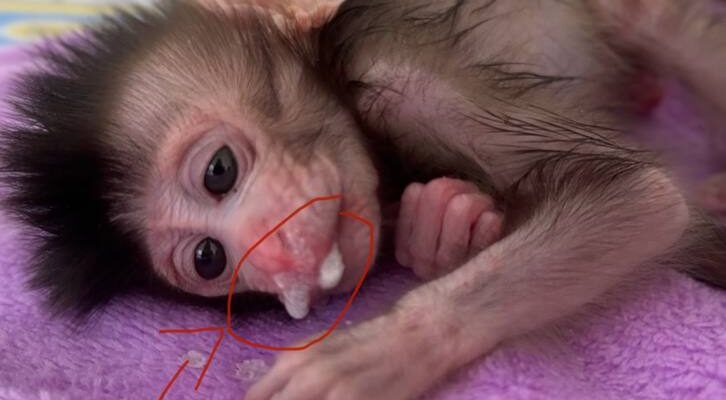Caring for a baby monkey is a deeply rewarding yet demanding responsibility, especially when your little primate falls ill. Like human infants, baby monkeys are vulnerable to illnesses, and one of the most common ailments they can contract—especially in colder or unsanitary environments—is the flu. Though it may seem surprising, monkeys can catch flu viruses, often displaying symptoms similar to those in humans. Recognizing the signs early and taking appropriate action is key to helping your baby monkey recover safely.
Recognizing the Symptoms
The flu in baby monkeys typically presents with symptoms such as sneezing, coughing, nasal discharge, lethargy, fever, reduced appetite, and sometimes mild diarrhea. Their behavior may change as well—they may cling more than usual, sleep longer, or show less interest in play and food. It’s crucial to monitor any deviation from their normal activity, as baby monkeys, like human infants, cannot verbally express their discomfort.
Creating a Healing Environment
The first step in caring for a sick baby monkey is to create a calm, warm, and quiet environment. Flu symptoms can worsen in cold or drafty areas, so ensure the monkey’s enclosure maintains a stable, warm temperature—around 80°F (27°C) is generally comfortable for a baby monkey.
Cleanliness is critical. Sanitize their space regularly to avoid the spread of bacteria and viruses. Make sure to wash your hands thoroughly before and after handling your monkey to reduce the risk of cross-contamination—especially if other animals are present in the home.
Hydration and Nutrition
Flu can lead to dehydration, particularly if the monkey is running a fever or experiencing diarrhea. Offer plenty of fluids, such as clean water, diluted electrolyte solutions (safe for animals), or even warm, unsweetened herbal teas like chamomile if recommended by a veterinarian. Keep their diet soft and easy to digest—mashed fruits like bananas or boiled sweet potatoes can be soothing and gentle on their stomach.
If your baby monkey refuses to eat or drink, consult a vet immediately. Young primates can deteriorate rapidly if they don’t receive proper nutrition and fluids.
Veterinary Care and Medication
Do not attempt to treat your monkey with human medications—many over-the-counter drugs are toxic to animals. Only a licensed exotic animal veterinarian should prescribe treatment. The vet may suggest antiviral medications, probiotics, or supplements to strengthen your monkey’s immune system, depending on the severity of the flu.
It’s wise to maintain a health record for your pet and schedule routine checkups even outside of illness episodes. Early intervention often means quicker recovery.
Preventing Future Illness
Once your monkey recovers, focus on strengthening its immune system through proper diet, hygiene, and stress-free living conditions. Avoid exposing your monkey to sick humans, as many illnesses—especially respiratory ones—can cross species lines. Regular veterinary visits, a balanced diet, and mental stimulation all contribute to a healthy, happy monkey.
Final Thoughts
Caring for a baby monkey with the flu requires patience, observation, and a lot of love. Their recovery depends not only on medication but also on your attentiveness and care. With the right approach, your little companion can bounce back to full health—and your bond will be even stronger for it.



